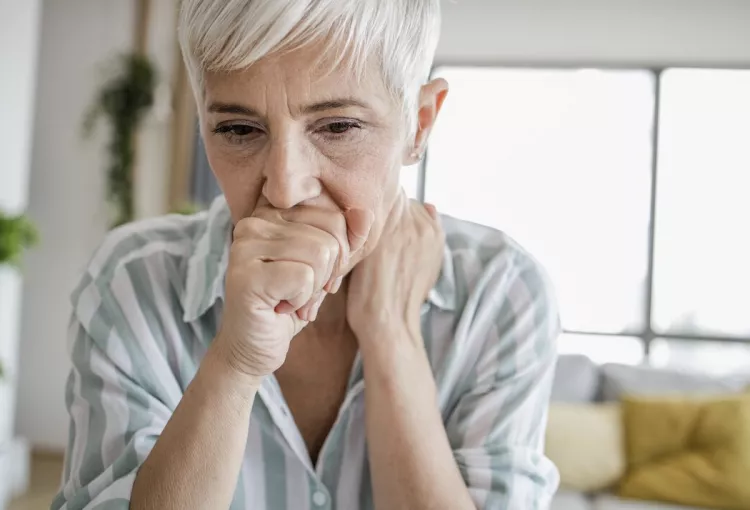Are you struggling with COPD even while being treated?
If you have had a COPD exacerbation in the last 12 months that required medical attention, you may qualify to participate in a clinical research study.
We are testing new investigational therapies to find out if they can reduce airway inflammation and improve COPD symptoms.
This website can help you and your doctor decide if one of the current COPD research studies could be an option for you.
Other eligibility criteria include
- Have symptomatic COPD
- Be a current or former smoker who quit 6 or more months before entering the study
- Have had a COPD exacerbation in the past 12 months that required medical attention
There are additional requirements to participate. The staff at the study center will explain the complete list of requirements. At a pre-screening and screening visit, the study doctor and staff will determine whether all requirements to participate are satisfied.
About the Study

The World Health Organization estimates that 65 million people worldwide have moderate to severe COPD. COPD is a major cause of disability and is expected to become the leading cause of death globally within the next two decades.
There is no cure for COPD. There are treatments available for doctors to prescribe, including treatments called maintenance therapies to help maintain regular breathing. Doctors may prescribe one of these maintenance therapies, or they may prescribe a combination therapy of 2 or 3. However, even with the combination of all 3 therapies (called “triple therapy”), some people still have COPD symptoms or experience COPD exacerbations, which can result in a hospital admission.
These research studies will assess whether new investigational therapies may reduce the occurrence of COPD exacerbations. The investigational therapies will be compared to other study treatments, such as a combination of 2 therapies, a marketed drug, or a placebo. A placebo looks like a drug but does not contain any actual medication. Placebos help to make sure that changes seen during a study are due to the investigational drug or another active medication and not another reason.
Common questions
What will happen if I join a study?
At a pre-screening visit, the study staff will first give a detailed explanation of the study and its potential risks and benefits. This explanation will be made verbally and in writing. Only after obtaining your written informed consent will study-specific procedures take place.
Next, during a screening visit, the study doctor and staff will conduct a series of examinations to determine whether the study is a good fit for you. If you pass screening, you will begin a 2-week preparation period before the treatment part of the study begins.
During the study, you will be required to:
- Take your assigned study treatment, as instructed by the study doctor
- Complete a daily electronic diary to record any COPD medications and respiratory symptoms
- Attend regular clinic visits for assessments to monitor your health and condition – there are 8 to 12 clinic visits in total in these studies, plus 1 to 2 phone calls
How long will I be in the study?
If you qualify and choose to participate in a study, you will be in the study for about 55 to 56 weeks. This will involve 8 to 12 visits to the study center. The study is divided into 4 parts: a pre-screening period (maximum 1 week), screening period (2 weeks), study treatment period (52 weeks), and follow-up period (1 week). Your participation is completely voluntary. This means you will be free to leave the study at any time. If you choose to leave the study, your study doctor will discuss treatment options with you.
What are my responsibilities if I take part in a study?
If you decide to take part in a study, it means that you agree to:
- Attend your study visits and complete study procedures
- Take your assigned study treatment, as instructed by the study doctor
- Record your medications and symptoms daily using an electronic device throughout the study
- Tell your study doctor and the study staff about any changes in your health, including visits to other doctors
- Talk to your study doctor before making any changes in your medications
What medications are being researched? Why are they being researched?
The medications being researched (called “Study Drugs” on this website) are inhaled medications that may reduce inflammation in the airways and improve COPD symptoms.
Some people on therapy for COPD still have symptoms or experience COPD exacerbations, which can result in a hospital admission. These studies will assess whether the Study Drugs can reduce the occurrence of these COPD exacerbations when taken instead of or in addition to your current therapy.
Will I take one of the Study Drugs?
If you qualify and choose to participate in a study, a computer will assign you to a study treatment group by chance. This is called randomization. Your assigned study treatment will include one or more of the following:
- A study drug, or
- A marketed drug, or
- A dual combination therapy, or
- A placebo
You cannot choose your study group, and you will not know which study treatment you receive. The study doctor and staff will also not know which study treatment you receive. Some study participants, including those who receive a placebo, will continue to take their current COPD therapy. If you develop pneumonia or have a COPD exacerbation while you are in a study, the study doctor will prescribe appropriate medications or treatments.
What is a placebo? Why is a placebo used?
A placebo looks like a drug but does not contain any actual medication. Placebos help to make sure that changes seen during a study are due to the investigational drug or another active medication and not another reason. Not all studies include a placebo. The study doctor and staff will tell you if a study includes a placebo before you decide if you want to take part in the study.
How are the Study Drugs taken?
The Study Drugs will be dispensed by an inhaler.
Your study doctor and the study staff will provide detailed instructions for storing, taking, and returning your assigned study treatment medications or placebos.
What will happen at study visits?
At visits to the study center various examinations and assessments will be done to monitor your health and condition.
Procedures at study visits may include:
- Assessment of COPD exacerbation
- Physical examination
- Measurement of your vital signs (blood pressure)
- Measurement of the electrical activity of your heart using an electrocardiogram (ECG)
- Review of any side effects and changes in your health and medications
- Drawing or collection of blood and urine samples
- Lung function measurement
- Completion of questionnaires
Study visits may also include additional procedures. Your study doctor will explain all procedures to you and answer any questions you may have.
Can I change my mind after starting a study?
Taking part in a study is always voluntary. It is your choice. If you qualify to take part in a study, you can choose to join the study or not join. If you join a study, you can change your mind and leave the study at any time, for any reason.
If you choose to leave a study, your decision will not affect the medical care you receive outside the study. There will be no penalty or loss of benefits to which you are otherwise entitled. Your study doctor will discuss treatment options with you.
Will I have to pay anything?
There is no cost to participate (except for your usual COPD therapy, if you continue taking this, and rescue medication, prescribed as needed). Qualified participants will receive their assigned study treatment as well as all required study-related medical assessments and examinations at no cost.
Compensation for travel expenses incurred as a result of study participation may also be available to those who satisfy applicable requirements.
Can I see other doctors while I am in a study?
You can visit any doctor to meet your health needs during a study. You should tell other health professionals you see that you are participating in a study. You should also let your study doctor know about any care you receive outside the study.
Are there any risks to participating in a study?
There may be potential risks to participating in a research study. All drugs and medical procedures carry a risk of side effects; therefore, it is possible that participants may experience some discomfort or other reactions from their assigned study treatment. More information on the risks and potential side effects will be explained at the pre-screening visit.
What are the potential benefits of participating?
If you decide you want to participate and are found suitable to participate, it means that your COPD is not ideally controlled on your current medication and the study medication assigned may improve your symptoms. However, it is important to remember that, as with any treatment, one can never be sure of the outcome. If you participate, your health may improve, it may stay the same, or it may get worse. The information learned from these studies may help find new treatment options for people suffering from COPD in the future.
What are the next steps?
If you think participating in a study may be right for you, please talk with your family and your doctor. If you wish to take the next step toward possible participation, you can answer a few questions in the online pre-screener to find out if you may qualify to participate. Answering the questions does not mean that you have to participate in a study. Participation is entirely voluntary, and you may withdraw your consent at any time for any reason.

